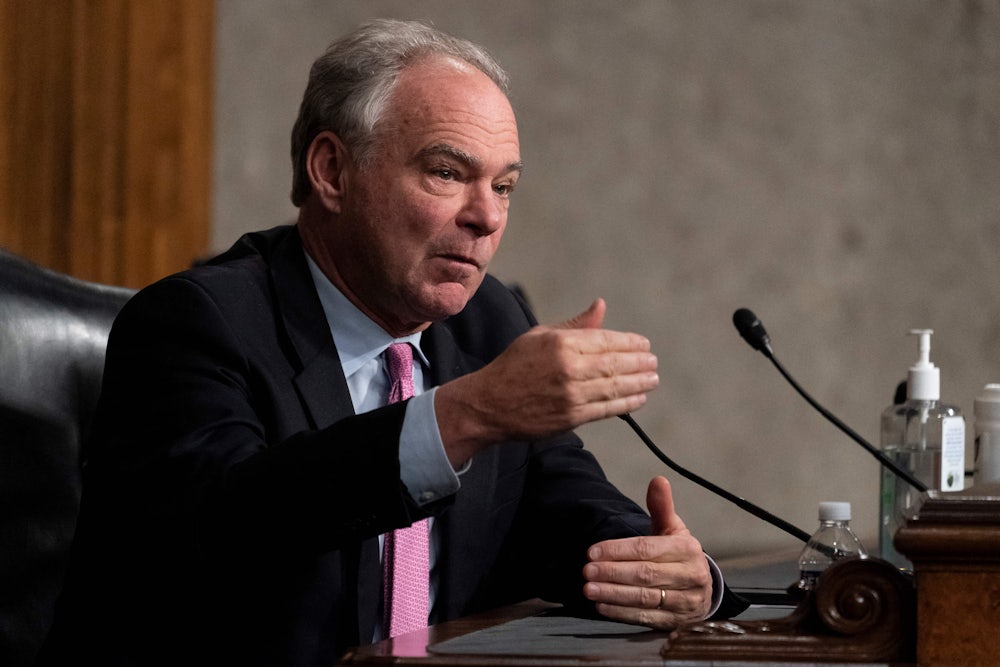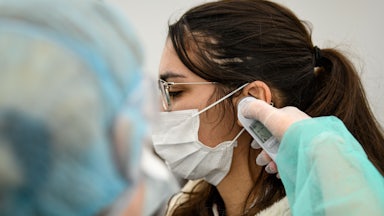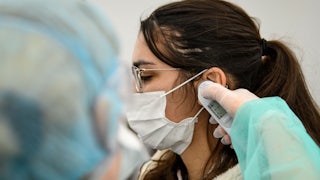News that a federal judge blocked the mask mandate on public transportation and airplanes this week was met with fanfare by many. But for others, such as immunocompromised Americans and parents with children too young to be vaccinated, there was little solace to be felt from the increasingly widespread sentiment that the burden of protecting oneself and others from the coronavirus is being shifted onto individuals.
For the vaccinated and boosted, the threat of the coronavirus is significantly diminished. However, there is still a possibility that their recovery could be hampered by continued protracted symptoms, known colloquially as “long Covid.” Many of the people who contracted the virus and developed long Covid at the beginning of the pandemic are still struggling with its effects years later. For these, the pandemic is far from over. Their brush with the virus has saddled them with medical conditions that could plague them for the rest of their lives. But beyond their health challenges, long-Covid sufferers have also had to face the challenge of having their condition recognized by the medical community. Those tides have ever so slowly begun to turn, and now, legislation to address the needs of long-Covid patients is taking shape in Washington.
Long Covid can involve a variety of symptoms in many combinations, including shortness of breath, persistent loss of smell and taste, tiredness or fatigue, and “post-exertional malaise”—effects that get worse after exercise or mental activities. Sometimes it is referred to as Post-Acute Sequelae of SARS-CoV-2, or PASC, an acronym that some point out is more difficult to remember than “long Covid”—a term coined by patients, ones who do not assume they are living postvirus. There is also significant overlap with long Covid and chronic symptoms like myalgic encephalomyelitis/chronic fatigue syndrome (ME/CFS), an illness that has historically been misunderstood and dismissed by medical experts. (As The Atlantic’s Ed Yong has noted, diagnoses of ME/CFS often follow disease outbreaks.)
We have more information about long Covid than we did at the beginning of the pandemic. But there are still many things we don’t know, among them the extent to which vaccines can be preventive—although recent studies do indicate that being fully vaccinated decreases the risk of later developing symptoms of long Covid. Definitions of long Covid also vary, with the Centers for Disease Control and Prevention and the World Health Organization differing on how long a person must be sick to meet the criteria for the condition. Bryan Lau, an epidemiologist at the Johns Hopkins Bloomberg School of Public Health and co-lead of the Johns Hopkins Covid Long Study, said that the sweeping definitions of long Covid can make it difficult to count how many people are experiencing symptoms. “There’s a lot of heterogeneity among those that have long Covid. There are people that seem to be functioning OK, to people who seem to be not functioning at all,” Lau told The New Republic.
Experts estimate that anywhere from 10 to 30 percent of coronavirus patients have developed long Covid, which would mean millions of people even at the lower end. A model by the American Academy of Physical Medicine and Rehabilitation (AAPM&R) assumes that 30 percent of Covid survivors in the U.S. contract long Covid, which would be nearly 24 million people. “I suppose the definition is a little less important. What’s more important is that there are a lot of folks out there who are dealing with symptoms that just last a heck of a long time,” said Steven Flanagan, a practicing physician in New York and president-elect of AAPM&R.
In purely capitalistic terms, this affects the health of the economy along with the general populace. A Brookings Institute study released in January estimated that the labor market may be missing up to 1.6 million workers due to long Covid, with long-Covid patients either out of work or reducing their work hours because of their condition. Moreover, because long Covid is chronic and can make it difficult to work, many people have lost their jobs and face challenges in receiving treatments that may not be covered by disability insurance.
“The communication piece is missing—people still don’t know what long Covid is and that it impacts all demographics. Brookings Institute estimated that 15 percent of unfilled jobs are due to long Covid, and yet it’s still not one of the major talking points for economists and policymakers,” Lisa McCorkell told The New Republic in an email. McCorkell is a researcher in the Patient-Led Research Collaborative, a self-organized group of long-Covid patients.
Another recent study found that 78,000 privately insured patients were treated for a post-Covid condition from October 2021 to January 2022 and that 60 percent of these patients were women or girls. Women have been leaving their jobs in disproportionately high numbers since the onset of the pandemic, in part because the burden of caretaking primarily rests on women. This data indicates that privately insured women are more likely to deal with long Covid as well. Moreover, researchers worry that people of color, who already face disproportionately high rates of Covid and resulting death, may also have higher rates of long Covid. A March report found that long-Covid trials, treatment programs, and registries need to do more to include Black Americans.
“We know that, for a number of policy and structural reasons, marginalized communities, communities of color, have been hardest hit by the pandemic. And when it comes to long Covid, as the public narrative has emerged about this, very often, those more diverse stories are not being told,” Representative Ayanna Pressley told The New Republic.
Pressley has introduced bicameral legislation, the TREAT Long Covid Act, that would increase access to medical care and treatment, ensure that coverage would not be denied based on a patient’s insurance, and provide funding to create long-Covid clinics, with an emphasis on funding for health providers that treat underserved populations and communities disproportionately affected by the coronavirus.
“What I want this community to know is that what they’re experiencing is not imaginary. It is real. It is as real as they are, and they deserve [help], and what they are experiencing warrants a federal response,” Pressley said.
Research into long Covid has been patient-led from the beginning of the pandemic, with sufferers initially conducting their own research in the face of dismissal from many medical experts. The first survey on the symptoms of long Covid, published in May 2020, was conducted by the Patient-Led Research Collaborative, which was born out of Body Politic, a support group on Slack, and its community of so-called long-haulers.
“Long Covid is receiving more and more acknowledgement from the medical community, but because there are so few providers well-versed in post-viral illness and long Covid research to date, patients are too often not receiving adequate care,” McCorkell said.
The exigencies of long Covid have received a federal response, albeit a slow one. The White House earlier this month released a memorandum announcing plans to expand research into long Covid and accelerate enrollment in a study on it run by the National Institutes of Health. Patients and experts raised concerns about the study, which had brought in just 3 percent of the patients it planned to recruit 15 months after receiving more than $1 billion from Congress, STAT News reported. The Biden administration’s announcement also came after a report by two dozen Covid experts argued that federal research into long Covid “incidence, causes, and treatments has been achingly slow” and that “return on federal investments has been poor.”
Lau said that the Johns Hopkins Covid Long Study originated in part because he and other researchers believed there was not much effort being put into investigating the long-term effects of Covid. While data collecting has improved since the beginning of the pandemic, he pointed to the “slow going” of the NIH study. “It takes time to generate good, quality data, which I get,” Lau said. “But you would imagine—given the scope in terms of how many people have been infected with Covid and that the ballpark numbers of what proportion would come down with long Covid—that it would go faster, because we’re talking about millions of people exposed.”
Flanagan said that there has not been enough research into long Covid thus far, but also noted that, due to the fact that it is a “novel” virus, research is still ongoing. “We’re optimistic that we’ll be getting more information, and the more we know about this, ultimately that will help guide therapies in the future,” he said. (AAPM&R has launched a multidisciplinary collaborative to research long Covid and develop guidance for treatment.) Flanagan said that he was encouraged by the president’s memorandum on long Covid: “It’s very satisfying to believe that we have been heard.”
“It’s getting the attention that it needs. How much of the public understands it? Not sure. But given that 25 million people or so have been affected by it, they are certainly aware of it, as are their families, and I would also say their employers,” Flanagan said.
That awareness may be reflected by recent legislation to address the issue, such as Pressley’s bill. Senator Tim Kaine, who has symptoms of long Covid, introduced legislation in March to expand research and provide resources for medical providers and patients. However, it’s unclear how much of a priority this will be for lawmakers when they return to Washington next week. Thus far, only Democrats have co-sponsored any of these bills. Moreover, the Senate already failed to pass a $10 billion Covid supplemental earlier this month before recessing for two weeks.
But Pressley is not worried about potential opposition from her colleagues. “I don’t even have time to be concerned. I just have to keep fighting and lobbying,” she said, explaining that she would be advocating for a coronavirus funding package, for long Covid to be addressed in that package, and for her own stand-alone bill.
“At the end of the day, momentum is growing. Awareness is growing,” Pressley told me. “Failure is not an option. We cannot leave a growing community of long-haulers behind.”
But in a society eager to move on from the pandemic, the extent to which the effects of long Covid are felt by the larger public is also questionable. “Most people are happy about being able to take off masks on planes and think it’s not a big issue. So, in that regard, society isn’t taking Covid seriously, so I don’t know that we could say that they’re taking long Covid seriously,” Lau said.
McCorkell agreed that long Covid still is not treated with enough seriousness, pointing to the CDC recently defining Covid community levels based in large part on hospitalizations, when many long Covid patients are never hospitalized.
“If people are talking about Covid but don’t include long Covid, they’re not looking at the full picture,” she said.










